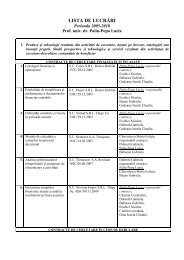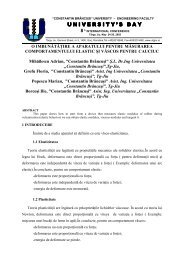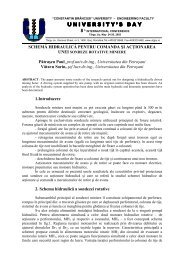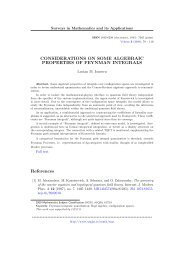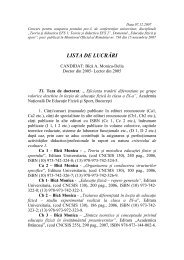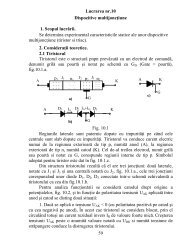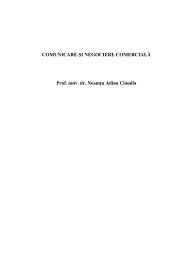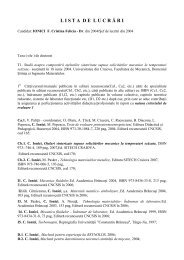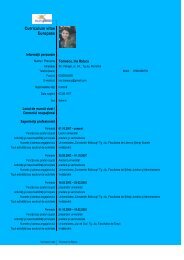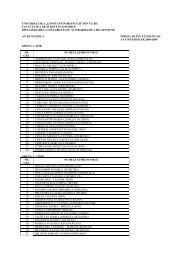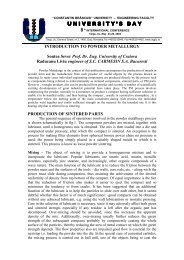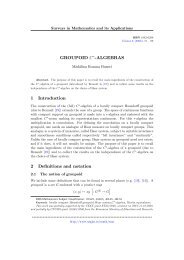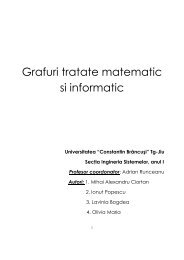Analele Universităţii “<strong>Constantin</strong> Brâncuşi” din Târgu Jiu, Seria Litere şi Ştiinţe Sociale, Nr. 2/<strong>2008</strong>suficiente spre a indica justificarea şilegitimitatea regimurilor democraticecomparativ cu cele non-democratice. Maimult, judecăţile normative nu se pot substituijudecăţilor obiective. Răspunsul la acesteprovocări nu poate fi formulat decât prinpunerea în discuţie a conceptelor dedemocraţie formală şi democraţie substanţială.2. Democraţia formală şi democraţiasubstanţialăEste ştiut că anticii nu tratau politiculca pe un «obiect» ce revendică o «metodă»specifică reprezentată din ştiinţele naturii, ci îlconsiderau un regim (politeia) ce conferăsocietăţii semnificaţiile sale centrale,„punându-i în ordine instituţiile şi regulile,modelând moravurile şi stilul de viaţă almembrilor săi” 15 .În concepţia anticilor, politiculreprezenta concomitent: un mod de organizare a Cetăţii; un mod de viaţă pentru cei din CetateAici îşi are sorginte distincţia întredemocraţia formală şi democraţia substanţială,dar şi coexistenţa acestora. Astfel, dacădemocraţia este redusă doar la realizareamodelelor de organizare a Cetăţii, atunci eaeste formală; dacă dimpotrivă, politicul esteabordat concomitent ca mod de organizare aCetăţii şi ca mod de viaţă pentru cei dinCetate, democraţia este formală şi substanţială.Regimurile democratice, ca orice tip deregim politic, conţin tensiuni imanente,tensiuni manifestate îndeosebi în planulîncercărilor de modernizare instituţională,urmare a nemulţumirilor faţă de funcţionarearegimului existent (limitele regimuluidemocratic) raportate la modul dorit deorganizare a Cetăţii. Aceste limite dovedescmenţinerea tensiunilor între democraţiaformală, bazată pe elaborarea şi respectarearegulilor şi procedurilor (inclusiv peconstrucţia instituţională) şi democraţiasubstanţială, care are ca finalitate rezultateleprocedurilor formale în privinţa bunăstăriicetăţenilor.Democraţia formală este condiţia sineaxiom, accepting the extension of the politicalparticipation sphere and the idea of voteuniversality, pluralism and compromise,positive contamination within the internationalplan are not enough arguments to indicate thejustification and legitimacy of democraticsystems in comparison to non-democratic ones.Moreover, normative judgements cannotreplace objective judgements. The answer tothese challenges cannot be formulates unlessdiscussing the problems of formal democracyand substantial democracy.2. Formal democracy and substantialdemocracyIt is known that Ancient people did nottreat politics as an “object” claiming a specific“method” represented by nature sciences, butlooked at it as a system (politeia) offering thesociety its central meanings, “putting itsinstitutions and rules in order, modelling theneeds and lifestyle of its members” 30 .In the Ancient people’s view, politicswas at the same time: A way of organizing the town; A way of life for people inside the townThis originates the distinction betweenformal democracy and substantial democracy ,but their coexistence also. Therefore, ifdemocracy is reduced to developing the formsof organizing the Town, then it is formal; if, onthe contrary, politics is approaches at the sametime as a form of organizing the Town and wayof life for people inside the Town, democracy isformal and substantial.Democratic systems, like any type ofpolitical system, include immanent tensions,appeared especially in the plan of institutionalmodernization trials, due to complaints aboutthe existent system (the limitations of thedemocratic system) reported to the desired wayof organizing the Town. These limitations provethe persistence of the tensions between formaldemocracy, based on elaboration andcompliance with the rules and procedures(including on institutional construction) andsubstantial democracy which has the finality offormal procedures results regarding citizens’Annals of the „<strong>Constantin</strong> Brâncuşi” University of Târgu Jiu, Series Letters and Social Sciences, No. 2/<strong>2008</strong>14
Analele Universităţii “<strong>Constantin</strong> Brâncuşi” din Târgu Jiu, Seria Litere şi Ştiinţe Sociale, Nr. 2/<strong>2008</strong>qua non (dar insuficientă) a democraţieisubstanţiale, ca democraţie in actu (mod deviaţă); prima este mijlocul de atingere şirealizare a condiţiei umane dorite şi aşteptate,iar cea de-a doua exprimă măsura în carecadrul instituţional-normativ elaborat,construit şi aplicat transformă condiţia umană,adică modul de viaţă pentru cei din Cetate.Ori, cum societăţile democratice formalizatesunt prin natura lor plurale (conţinând chiarcomunităţi plurale), creează implicit şiimplacabil nu doar poliarhii, ci şi ierarhii(natural-obiective, dar mai grav, de tipoligarhic). Aşteptările, dorinţele sestructurează, la rândul lor în:a) opinii subiectual - verosimile (nivelde viaţă individual acceptat / respins /contestat);b) percepţii ale grupurilor,comunităţilor obiectivate – opinia publică(nivel de viaţă acceptat / contestat);c) forme de conştiinţă elaborate (teorii,doctrine, ideologii), referitoare la capacitateademocraţiei formale în a transforma condiţiaumană dintr-o comunitate (evaluarea obiectivăa progresului/stagnării/regresului nivelului deviaţă funcţie de democraţia formală). Şi dinacest punct de vedere, conduita poate fijustificativă / contestatoare.Toate cele trei forme de structurare aaşteptărilor sunt comparative (fie pe intervalede timp, fie, atunci când regimuriledemocratice succed regimurilor nondemocratice,comparaţiile sunt realizate prinprisma condiţiei umane), iar indicatoriiutilizaţi vizează nivelul de viaţă aşa cum esteel perceput (individual sau la nivelul unorgrupuri) sau cum rezultă din analizelefundamentate ştiinţific. Impactulconştientizării rezultatelor raportăriiaşteptărilor la împliniri se evidenţiază încomportamente (la vot, la acţiuni de susţineresau contestare – comportamente active – sauabţinere, pasivitate, absenteism –comportamente pasive).welfare.Formal democracy is the sine qua noncondition (but not enough) for substantialdemocracy as in actu democracy (way of life);the first one is the way to reach and achieve thedesired and expected human condition, and thesecond one expresses the extent to which theelaborated, built and enforced institutional andnormative background transforms humancondition, meaning the way of life for people inthe Town. And, knowing the fact thatformalized democratic societies are plural bynature (including even plural communities),they implicitly and implacably create not justpoliarchies but hierarchies also (natural –objective, and more seriously, oligarchic typeones). Expectations, desires are structured intheir turn into:a) subjectual – credible opinions(accepted / rejected / contested individuallifestyle);b) perceptions of groups, objectivedcommunities – public opinion (accepted /contested lifestyle);c) elaborated forms of conscience(theories, doctrines, ideologies), regarding thecapacity of formal democracy to transformhuman condition from a community (objectiveassessment of progress/ stagnation/ regress oflifestyle in accordance with formal democracy).From this point of view, conduct may bejustifying / contesting.All its three forms of structuring theexpectations are comparative (either on timeperiods, either, when democratic systemssucceed to non-democratic systems,comparisons are made through the view ofhuman condition), and indicators used focus onthe lifestyle as it is perceived (individually or atthe level of some groups) as resulting fromscientifically grounded analyses. The impact ofbeing aware of the results of expectationsreporting to achievements is underlined inbehaviours (to vote, support or contestationactions – active behaviours – refrain, passivity,absence – passive behaviours).Annals of the „<strong>Constantin</strong> Brâncuşi” University of Târgu Jiu, Series Letters and Social Sciences, No. 2/<strong>2008</strong>15
- Page 5: CUPRINS:1. CUNOAŞTERE - CULTURĂ
- Page 8 and 9: Analele Universităţii “Constant
- Page 10 and 11: Analele Universităţii “Constant
- Page 12 and 13: Analele Universităţii “Constant
- Page 14 and 15: Analele Universităţii “Constant
- Page 18 and 19: Analele Universităţii “Constant
- Page 20 and 21: Analele Universităţii “Constant
- Page 22 and 23: Analele Universităţii “Constant
- Page 24 and 25: Analele Universităţii “Constant
- Page 26 and 27: Analele Universităţii “Constant
- Page 28 and 29: Analele Universităţii “Constant
- Page 30 and 31: Analele Universităţii “Constant
- Page 32 and 33: Analele Universităţii “Constant
- Page 34 and 35: Analele Universităţii “Constant
- Page 36 and 37: Analele Universităţii “Constant
- Page 38 and 39: Analele Universităţii “Constant
- Page 40 and 41: Analele Universităţii “Constant
- Page 42 and 43: Analele Universităţii “Constant
- Page 44 and 45: Analele Universităţii “Constant
- Page 46 and 47: Analele Universităţii “Constant
- Page 48 and 49: Analele Universităţii “Constant
- Page 50 and 51: Analele Universităţii “Constant
- Page 52 and 53: Analele Universităţii “Constant
- Page 54 and 55: Analele Universităţii “Constant
- Page 56 and 57: Analele Universităţii “Constant
- Page 58 and 59: Analele Universităţii “Constant
- Page 60 and 61: Analele Universităţii “Constant
- Page 62 and 63: Analele Universităţii “Constant
- Page 64 and 65: Analele Universităţii “Constant
- Page 66 and 67:
Analele Universităţii “Constant
- Page 68 and 69:
Analele Universităţii “Constant
- Page 70 and 71:
Analele Universităţii “Constant
- Page 72 and 73:
Analele Universităţii “Constant
- Page 74 and 75:
Analele Universităţii “Constant
- Page 76 and 77:
Analele Universităţii “Constant
- Page 78 and 79:
Analele Universităţii “Constant
- Page 80 and 81:
Analele Universităţii “Constant
- Page 82 and 83:
Analele Universităţii “Constant
- Page 84 and 85:
Analele Universităţii “Constant
- Page 86 and 87:
Analele Universităţii “Constant
- Page 88 and 89:
Analele Universităţii “Constant
- Page 90 and 91:
Analele Universităţii “Constant
- Page 92 and 93:
Analele Universităţii “Constant
- Page 94 and 95:
Analele Universităţii “Constant
- Page 96 and 97:
Analele Universităţii “Constant
- Page 98 and 99:
Analele Universităţii “Constant
- Page 100 and 101:
Analele Universităţii “Constant
- Page 102 and 103:
Analele Universităţii “Constant
- Page 104 and 105:
Analele Universităţii “Constant
- Page 106 and 107:
Analele Universităţii “Constant
- Page 108 and 109:
Analele Universităţii “Constant
- Page 110 and 111:
Analele Universităţii “Constant
- Page 112 and 113:
Analele Universităţii “Constant
- Page 114 and 115:
Analele Universităţii “Constant
- Page 116 and 117:
Analele Universităţii “Constant
- Page 118 and 119:
Analele Universităţii “Constant
- Page 120 and 121:
Analele Universităţii “Constant
- Page 122 and 123:
Analele Universităţii “Constant
- Page 124 and 125:
Analele Universităţii “Constant
- Page 126 and 127:
Analele Universităţii “Constant
- Page 128 and 129:
Analele Universităţii “Constant
- Page 130 and 131:
Analele Universităţii “Constant
- Page 132 and 133:
Analele Universităţii “Constant
- Page 134 and 135:
Analele Universităţii “Constant
- Page 136 and 137:
Analele Universităţii “Constant
- Page 138 and 139:
Analele Universităţii “Constant
- Page 140 and 141:
Analele Universităţii “Constant
- Page 142 and 143:
Analele Universităţii “Constant
- Page 144 and 145:
Analele Universităţii “Constant
- Page 146 and 147:
Analele Universităţii “Constant
- Page 148 and 149:
Analele Universităţii “Constant
- Page 150 and 151:
Analele Universităţii “Constant
- Page 152 and 153:
Analele Universităţii “Constant
- Page 154 and 155:
Analele Universităţii “Constant
- Page 156 and 157:
Analele Universităţii “Constant
- Page 158 and 159:
Analele Universităţii “Constant
- Page 160 and 161:
Analele Universităţii “Constant
- Page 162 and 163:
Analele Universităţii “Constant
- Page 164 and 165:
Analele Universităţii “Constant
- Page 166 and 167:
Analele Universităţii “Constant
- Page 168 and 169:
Analele Universităţii “Constant
- Page 170 and 171:
Analele Universităţii “Constant
- Page 172 and 173:
Analele Universităţii “Constant
- Page 174 and 175:
Analele Universităţii “Constant
- Page 176 and 177:
Analele Universităţii “Constant
- Page 178 and 179:
Analele Universităţii “Constant
- Page 180 and 181:
Analele Universităţii “Constant
- Page 182 and 183:
Analele Universităţii “Constant
- Page 184 and 185:
Analele Universităţii “Constant
- Page 186 and 187:
Analele Universităţii “Constant
- Page 188 and 189:
Analele Universităţii “Constant
- Page 190 and 191:
Analele Universităţii “Constant
- Page 192 and 193:
Analele Universităţii “Constant
- Page 194 and 195:
Analele Universităţii “Constant
- Page 196 and 197:
Analele Universităţii “Constant
- Page 198 and 199:
Analele Universităţii “Constant
- Page 200 and 201:
Analele Universităţii “Constant
- Page 202 and 203:
Analele Universităţii “Constant



